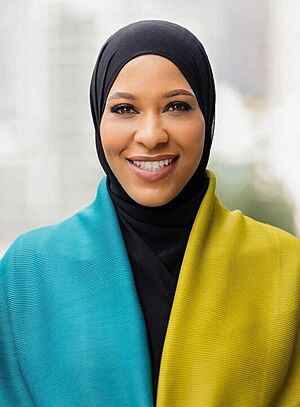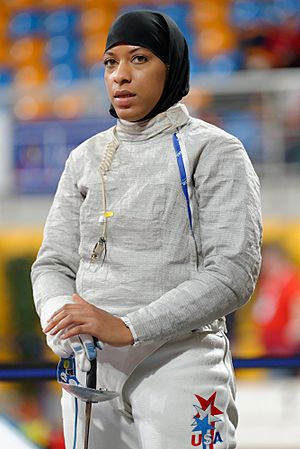Ibtihaj Muhammad facts for kids
Quick facts for kids Ibtihaj Muhammad |
||||||||||||||||||||||||||||||||||||||
|---|---|---|---|---|---|---|---|---|---|---|---|---|---|---|---|---|---|---|---|---|---|---|---|---|---|---|---|---|---|---|---|---|---|---|---|---|---|---|

Script error: The function "getImageLegend" does not exist.
|
||||||||||||||||||||||||||||||||||||||
| Personal information | ||||||||||||||||||||||||||||||||||||||
| Born | December 4, 1985 Maplewood, New Jersey, US |
|||||||||||||||||||||||||||||||||||||
| Height | 1.70 m (5 ft 7 in) | |||||||||||||||||||||||||||||||||||||
| Weight | 68 kg (150 lb) | |||||||||||||||||||||||||||||||||||||
| Sport | ||||||||||||||||||||||||||||||||||||||
| Country | ||||||||||||||||||||||||||||||||||||||
| Sport | Fencing | |||||||||||||||||||||||||||||||||||||
| Weapon | Sabre | |||||||||||||||||||||||||||||||||||||
| Hand | Right | |||||||||||||||||||||||||||||||||||||
| Years on national team | 8 | |||||||||||||||||||||||||||||||||||||
| National coach | Ed Korfanty | |||||||||||||||||||||||||||||||||||||
| Club | Peter Westbrook Foundation | |||||||||||||||||||||||||||||||||||||
| FIE ranking | Current ranking | |||||||||||||||||||||||||||||||||||||
|
Medal record
|
||||||||||||||||||||||||||||||||||||||
Ibtihaj Muhammad (born December 4, 1985) is an amazing American fencer, author, and entrepreneur. She is also an Olympic medalist. At the 2016 Summer Olympics, she made history in several ways. She was the first American woman to compete in the Olympics while wearing a hijab. She was also the first American Muslim woman to win an Olympic medal. Additionally, she was the first Black woman to win an Olympic medal in the sabre event. She earned a bronze medal in the women's sabre team competition.
Ibtihaj Muhammad has won many awards. She is a five-time World medalist, earning medals in 2011, 2012, 2013, and 2015. At the 2014 World Fencing Championships, she won a gold medal with the United States women's sabre team.
Her influence goes beyond sports. Time 100 recognized her as one of the Most Influential People in the World in 2016. She serves as a sports ambassador for the United States Department of State. She is also a successful author, with books appearing on the New York Times Best-seller list.
Contents
Early Life and Fencing Journey
Ibtihaj Muhammad was born on December 4, 1985, in New Jersey. She grew up in Maplewood, New Jersey, with her two older siblings, Brandilyn and Qareeb, and two younger siblings, Asiya and Faizah. Her parents are of African American heritage.
Ibtihaj started fencing when she was 13 years old. She learned the sport at Columbia High School (New Jersey). In 2002, she joined the Peter Westbrook Foundation in New York City. This foundation helps young people learn fencing.
After finishing high school in 2003, Ibtihaj attended Duke University in Durham, North Carolina. There, she continued her fencing career. She was recognized as an All-American three times for her athletic skills. In 2007, she graduated from Duke with two majors: International Relations and African & African-American Studies.
Becoming a National Fencer
Ibtihaj Muhammad achieved a big milestone in 2010. She qualified for her first United States National Fencing Team. This made her the first woman of color to join the women's sabre team. She was a key member of the United States National Team from 2010 to 2017.
Throughout her career, Ibtihaj earned many honors. She became a two-time National Champion in 2009 and 2017. She also won 19 World Cup medals. At one point, she was ranked as high as No. 7 in the entire world. She is a five-time Senior World medalist, winning medals in 2011, 2012, 2013, and 2015. Her team won a gold medal at the 2014 Fencing World Championships.
Olympic Glory in 2016
The 2016 Summer Olympics were a truly special moment for Ibtihaj Muhammad. She achieved several historic firsts. She was the first American woman to compete in the Olympics while wearing a hijab. This was a significant moment for representation in sports.
She also became the first American Muslim woman to win an Olympic medal. Additionally, she was the first Black woman to win an Olympic medal in the sabre event. She earned a bronze medal as part of the women's sabre team. The team showed great skill, defeating Italy 45–30 in the bronze medal match. Her presence at the Olympics, visibly wearing her hijab, made her a powerful symbol. The Guardian newspaper described her as "one of the best symbols against intolerance America can ever have" in 2016.
Beyond the Fencing Strip
Ibtihaj Muhammad has many interests and talents outside of fencing. She uses her platform to inspire others and promote positive change.
Louella by Ibtihaj: Fashion and Modesty
In 2014, Ibtihaj and her siblings started a clothing company. It is called Louella by Ibtihaj. Their goal was to offer modest yet fashionable clothing in the United States. They wanted to provide stylish options for everyone.
Inspiring Others: Ambassador and Barbie Shero
Ibtihaj is also a dedicated sports ambassador. She works with the U.S. Department of State’s Empowering Women and Girls Through Sport Initiative. Through this role, she has traveled to many countries. She talks about how important sports and education are for young people.
In 2017, the toy company Mattel honored Ibtihaj. They named her a Barbie “Shero.” A Shero is a woman who breaks barriers and inspires girls. Mattel created the first Barbie doll in her likeness that wore a hijab and was a fencer. In 2019, Ibtihaj was recognized as a Global Ambassador for Special Olympics. She continues to support people with intellectual disabilities. For example, she worked with Special Olympics athletes during the 2025 Global Week of Inclusion. Together, they created designs for the unified Athlete Design Co_Lab.
Authoring Inspiring Books
Ibtihaj Muhammad is also a talented author. In 2018, she released her first memoir. It was titled Proud: My Fight for an Unlikely American Dream. She has also written a popular series of children’s books. These books include The Proudest Blue: A Story of Hijab & Family, published in 2019. This book became an instant New York Times Best-seller. She followed it with The Kindest Red: A Story of Hijab and Friendship in 2023. Her latest book, The Boldest White: A Story of Hijab & Community, was published in 2024. Her children's books have been recognized for their quality. The Proudest Blue was a finalist for the Forest of Reading's Blue Spruce Award in 2021. The Kindest Red was also a finalist for the same award in 2024.
- Muhammad, Ibtihaj. (2018) Proud: My Fight for an Unlikely American Dream. New York: Hachette Books. ISBN: 9780316518963
- Muhammad, Ibtihaj. (2018) (Young Readers Edition) Proud: Living My American Dream. New York: Little, Brown and Company. ISBN: 9780316477000
- Muhammad, Ibtihaj. (2018) The Proudest Blue: A Story of Hijab and Family. New York: Little, Brown and Company. ISBN: 9780316519007
- Muhammad, Ibtihaj. (2023) The Kindest Red: A Story of Hijab and Friendship. New York: Little, Brown and Company. ISBN: 9780759555709
- Muhammad, Ibtihaj. (2024) The Boldest White: A Story of Hijab and Community. New York: Little, Brown and Company. ISBN: 9780759555716
See also
 In Spanish: Ibtihaj Muhammad para niños
In Spanish: Ibtihaj Muhammad para niños
- Muslim women in sport
 | Mary Eliza Mahoney |
 | Susie King Taylor |
 | Ida Gray |
 | Eliza Ann Grier |


